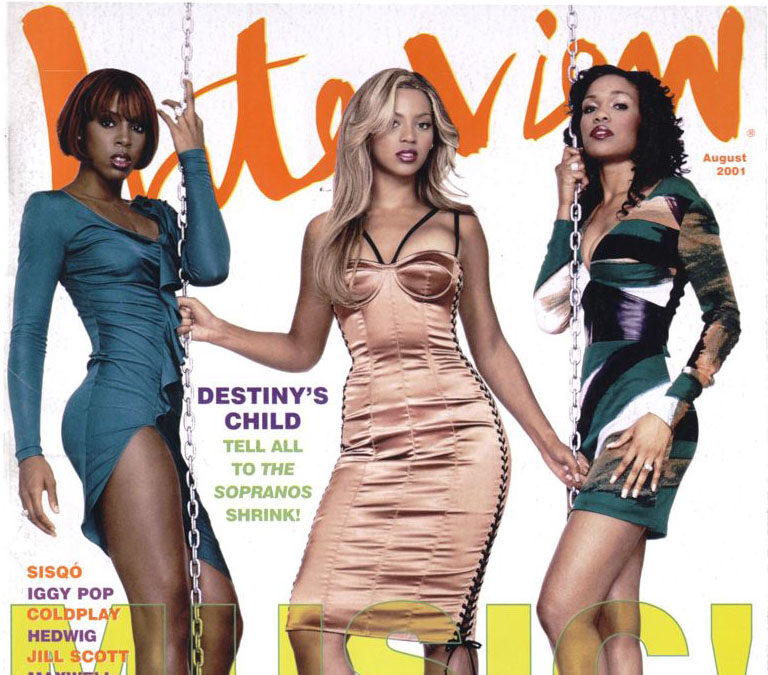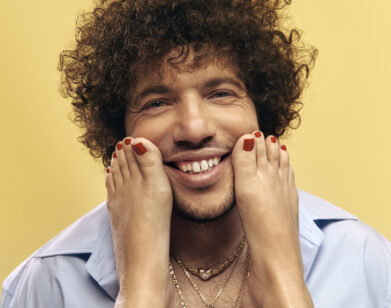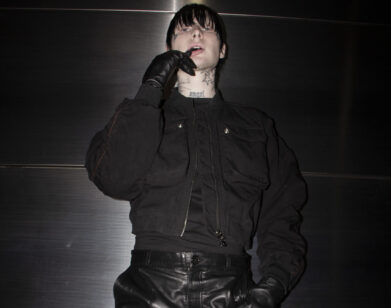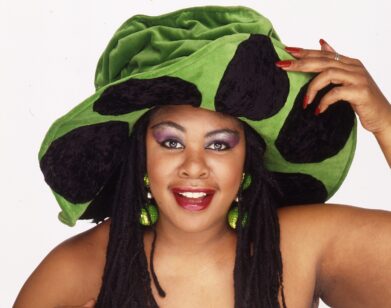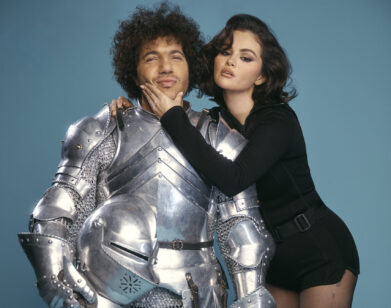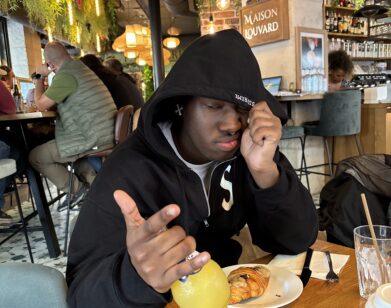New Again: Destiny’s Child
In New Again, we highlight a piece from Interview’s past that resonates with the present.
To reunite or not to reunite… In the few days left until Super Bowl XLVII this weekend, rumors are still circulating on the status of Beyoncé’s halftime performance: will she be joined by Michelle Williams and Kelly Rowland and perform as Destiny’s Child, the apex of early 2000s R&B pop? We know why we desperately crave the answer. It would be glorious: hopefully a tribute to yesteryears filled with blinding sparkle, coordinated outfits, and toned gams perfectly preserved since the group’s disbandment in 2006. We wouldn’t even care if they lip-synced, if their lips formed the word “Bootylicious.”
Various sources have reported that Destiny’s Child will not be reuniting to perform hits like “Bills, Bills, Bills” and “Survivor” for the Super Bowl show, after former band member Michelle Williams stated the appearance was “not confirmed”, and she would be performing in her musical, Fela. Tricky investigative skills employed at Vanity Fair, however, reveal that Destiny’s Child shouldn’t lose hope; Beyoncé may still pull out the moves that set her on the path to superstardom, with the crucial help of some old friends.
In an August 2001 issue, the summer after their release of Survivor, we caught Destiny’s Child at peak form with the help of Sopranos actress Lorraine Bracco. —Suzanne Hodges
Destiny’s Child
by Lorraine Bracco
They’re so big we sent them to The Sopranos’ shrink.
LORRAINE BRACCO: Right now, in the summer of 2001, Destiny’s Child is at the top of the music industry. We can all imagine how it feels—great! [laughs] So I’m not going to talk to ask you about that. Instead, let’s talk about one of your songs that I’ve been thinking about a lot in the last few days: “Bootylicious.” The name alone makes me smile. [laughs] So tell me how you came up with it. You’re just hanging out one day and all of a sudden it comes into your head?
BEYONCÉ KNOWLES: Yeah. [laughs] Pretty much. What’s your interpretation of it?
LORRAINE BRACCO: Well, I think it was evident from the video that your message is everybody’s different and being sexy is a state of mind.
BEYONCÉ KNOWLES: That’s exactly what it is.
LORRAINE BRACCO: A lot of your music seems to be very supportive of women.
MICHELLE WILLIAMS: Well, there’s so much negativity [around] that sometimes kids really need to hear positive reinforcement.
LORRAINE BRACCO: Let’s talk about negativity for a minute. Racism—is it something you’ve experienced?
BEYONCÉ KNOWLES: Yeah, you get racism all the time. Everybody does. Especially with airlines.
LORRAINE BRACCO: Really?
KELLY ROWLAND: They’re the worst.
LORRAINE BRACCO: I think they’re nasty to everybody. You know, growing up, I lived in a neighborhood in Long Island where there was basically one black family. And I remember hearing all the parents and the kids in the neighborhood say racist things about this family. I moved into this neighborhood when I was eight years old, and by the time I was 10, I swore that I was never going to see color. I realized that racism is taught at home. I’m curious what you learned as kids growing up Houston.
KELLY ROWLAND: I remember being at school, and the teachers sitting me in the back. One teacher made it known that he was superior, and I was inferior. [pause] I hope I see him one day.
LORRAINE BRACCO: Oh, I hope you see him too, honey. I’d like to be there that day!
BEYONCÉ KNOWLES: It still happens, even now. We did an interview yesterdays, and a woman asked us, “Where did you meet? In the ‘hood?”
MICHELLE WILLIAMS: Like we couldn’t meet in the suburbs.
BEYONCÉ KNOWLES: I grew up in a very nice house in Houston, went to private school all my life and I’ve never even been to the ‘hood. Not that there’s anything wrong with the ‘hood, but just to assume that I grew up there because of my color… Even now, getting covers or magazines or getting respect at labels is totally different for us [as women of color]. Even though we’ve sold way more records than some artists and we’re way more successful, they’re treated like more of a priority. I hate to say that, but it’s the truth.
MICHELLE WILLIAMS: Like one of the airlines telling us we didn’t qualify for some of their special services, because we’re an R&B group.
TINA KNOWLES (BEYONCÉ’S MOTHER): What they said was they didn’t consider R&B to be VIP, which was very insulting.
LORRAINE BRACCO: I don’t even know what to say about that! You better tell Tommy Mottola [CEO of Sony Music Entertainment, which houses Destiny’s Child’s label] you need your own plane! [laughter] OK, Beyoncé: you starred in MTV’s movie version of Carmen recently. A lot of musicians I know—David Bowie, Mick Jagger, Jon Bon Jovi—they’re making music and they’re making movies. Tell me about your experience with acting.
BEYONCÉ KNOWLES: MTV came to a Destiny’s Child show with the script, and at the time, acting wasn’t something I was planning to do. I think music is something that can, and should, be used to get you into different things because eventually what goes up must come down—we’re not going to be the number one group in the world forever—so you have to have something else to fall back on. I did Carmen because I liked the script and I thought it was really cool.
LORRAINE BRACCO: Was it a good experience?
BEYONCÉ KNOWLES: It was a great experience.
LORRAINE BRACCO: I have a question for you, Michelle. On The Sopranos we’re a big team, and we get along. We’ve been together for three years now. We brought in some new actors this year, and they were like, “Oh my God, I’m scared!” Annabella Sciorra was sweating, and Joe Pantoliano was like, “I’m not going to make it!” I mean, they were really panicked. So you had a big challenge there, coming into this group just over a year ago, after they’d already released two very successful albums.
MICHELLE WILLIAMS: As soon as I arrived, everyone welcomed me with open arms. I was like, “I’m not a stranger,” and that helped me to build up confidence. There were so many things I’d never done before I got into the group, but Beyoncé and Kelly helped me to adjust.
LORRAINE BRACCO: Like what?
MICHELLE WILLIAMS: Dancing in high heels. [laughter] Wearing makeup, doing all the press and promotional work. They were like, “OK, Michelle—it’s fun at times, but it’s more than the makeup and the pretty hair. You’re gonna get up early in the morning and work.”
LORRAINE BRACCO: Kelly, you’ve been living with Beyoncé and her family for 11 years. Tell me about that—how’d that happen?
KELLY ROWLAND: Well, when I was nine, my mom was working as a live-in nanny. We were rehearsing every day and, with my mom’s schedule, she couldn’t really take me back and forth to all the rehearsals. So in order to make it work, my mom asked Tina, “Could Kelly stay with you for the summer?” And the summer turned into how long? [laughs] But it was like a big ol’ happy family because my mom came over every night to kiss me good night. I say I have three parents—Tina and Matthew [Knowles, Beyoncé’s father], and my mom—three wise people to help me.
LORRAINE BRACCO: Mom, it takes a very special woman to do that with.
TINA KNOWLES: Kelly has been a great joy in my life. I’m going to be so sad the day she moves out—she’s talking about it, and I have bad dreams about it—because she and Beyoncé have been such wonderful kids.
LORRAINE BRACCO: Let’s talk about God for a moment. I’ve listened to your “Gospel Medley” on Survivor many times and I’ve read and seen countless interviews in which you discuss God and his importance in your lives. I remember my daughter Stella asking me many years ago, “Ma, how do you talk to God?” So now I’m going to ask you: How do you talk to God?
MICHELLE WILLIAMS: I talk to God through prayer.
LORRAINE BRACCO: How do you start off the conversation?
KELLY ROWLAND: I talk to him like that the friend that he is. You don’t necessarily need to be like “Dear God…” You can just be like, “Friend, hey, I need your help.”
BEYONCÉ KNOWLES: Whenever I’m confused about something I ask God to reveal the answers to my questions, and he does. That’s how we found our name—we opened up the Bible, and the word “destiny” was right there. You know, through God, I’m learning how to appreciate the good and the bad. That’s why in “Gospel Medley,” the song you mentioned earlier, we thank God for our struggles, for our trials and tribulations, because they’ve made us who we are. If everything was perfect you would never learn and you would never grow.
LORRAINE BRACCO: And you would never have anything to write about. To be able to turn those situations into art, into having something to say, is a huge gift.
BEYONCÉ KNOWLES: Exactly.
LORRAINE BRACCO: What are some of the lessons you’ve learned from the hard times?
KELLY ROWLAND: I’ve learned to keep my head up and remember how blessed I am. I remember when Beyoncé and I were at our lowest, my Aunt Tina would come in the room and say, “No, we’re not going to sit around in a funk today. We’re going to get out and be positive, and we’re going to make this situation better.” I also learned about betrayal, and I think above all, to keep my circle tight.
BEYONCÉ KNOWLES: The main thing I’ve learned is not to judge people. Because you don’t really know how terrible it is to judge somebody until you get judged. And you don’t know how terrible gossip is until the gossip is about you. I think we’ve also learned how to communicate better, because communication in a group is the key. We’ve learned about loyalty, about the importance of loving and caring about the people in the group, sticking together, how to be a friend, how to apologize when you’re wrong, and how to compromise.
LORRAINE BRACCO: Beyoncé, a while back you were quoted as saying [reading]: “You read something in the press, you hear something crazy, and you get sad and depressed.” When you hear things about yourself, whether it’s in The New York Times or in the schoolyard, how do you learn to not take it to heart, to not get depressed?
BEYONCÉ KNOWLES: When you love and accept yourself, when you know who really cares about you, and when you learn from your mistakes, then you stop caring about what people who don’t know you think. Usually the person talking is just jealous or sad about themselves, and it takes going through this to realize that’s how life is.
LORRAINE BRACCO: Clearly you went through a hard time, and it looks like you’ve come out at the other end. OK. Last question. I have to tell you guys, I was pretty surprised that you sang at George W. Bush’s inauguration.
BEYONCÉ KNOWLES: A lot of people were.
LORRAINE BRACCO: So tell me.
TINA KNOWLES: It wasn’t political. The agreement was that the organizers would take down all the signs and everything that was politically connected and that they [the girls] would just perform for the kids.
LORRAINE BRACCO: So basically you just went because you wanted to do it and not because you were telling people who to vote for, or anything like that.
BEYONCÉ KNOWLES: Exactly. They really, really wanted us to do it, and he’s our president. He told us that we have a bigger influence on kids than he does a lot of the time, and he appreciates that we’re positive role models.
LORRAINE BRACCO: I agree with that, and I’m going to tell you why: because you have something to say.
BEYONCÉ KNOWLES: A lot of young girls suffer from low self-esteem. From child abuse, divorce, peer pressure, all of those things. I think we concentrate on making people feel like they can survive different situations and they can be strong and independent and love themselves.
THIS INTERVIEW ORIGINALLY APPEARED IN THE AUGUST 2001 ISSUE OF INTERVIEW.
New Again runs every Wednesday. For more, click here.

